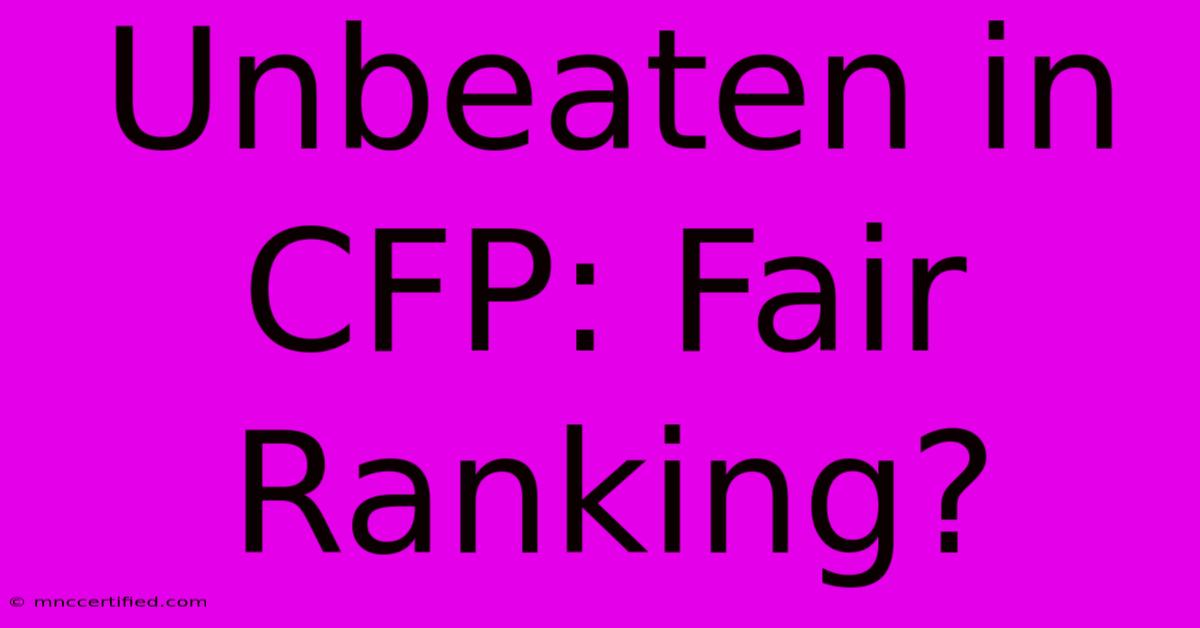Unbeaten In CFP: Fair Ranking?

Table of Contents
Unbeaten in CFP: Fair Ranking? A Deeper Dive into College Football Selection
The College Football Playoff (CFP) system has faced criticism since its inception, with a recurring debate centering on whether an unbeaten team should automatically receive a spot. While the stated goal is to select the four "best" teams, the subjectivity of "best" and the potential for undefeated teams to be left out fuels ongoing controversy. This article will explore the complexities of CFP rankings, examining the arguments for and against automatic bids for undefeated teams.
The Case for Automatic Bids: Justice for the Unbeaten?
The most compelling argument for automatic bids is simple: fairness. An undefeated team, having navigated a grueling season without a loss, deserves a place among the playoff contenders. This argument resonates with fans and coaches alike, emphasizing the accomplishment of an unbeaten regular season. It promotes a sense of meritocracy, rewarding teams for consistent excellence throughout the year. Furthermore, it could potentially alleviate the pressure and scrutiny surrounding the CFP selection committee's decisions, reducing accusations of bias or inconsistency.
Strength of Schedule Considerations
However, proponents of automatic bids acknowledge the need for nuance. Simply being undefeated shouldn't guarantee a spot; the strength of schedule needs to be considered. An undefeated team playing a weak conference schedule shouldn't automatically outrank a one-loss team with a significantly stronger schedule. A robust ranking system incorporating factors like strength of schedule, opponent win percentage, and quality wins would mitigate this concern. The focus should be on assessing the quality of the undefeated record, not merely its existence.
The Case Against Automatic Bids: A Holistic Approach
Opponents argue that an automatic bid system ignores the broader context of the season. A one-loss team with impressive wins against top-ranked opponents could arguably be a stronger contender than an undefeated team that dominated a weaker conference. The CFP selection committee's current system aims to evaluate the entirety of a team's performance, factoring in the quality of wins and losses, the margin of victories, and overall performance throughout the season. An automatic bid system might overlook these crucial aspects, leading to potentially less competitive playoffs.
Maintaining Competitive Balance
Moreover, the current system encourages competitive balance. Teams play knowing that a single loss doesn't necessarily eliminate their playoff chances, incentivizing them to play their best game every week against any opponent. An automatic bid system could potentially reduce the motivation for teams to compete against strong opponents, opting for a less challenging schedule to maintain an undefeated record. This could lead to a less exciting and less competitive regular season.
Finding a Balance: Improving the Current System
Instead of an automatic bid system, the focus should be on improving the transparency and consistency of the CFP selection committee's evaluation process. Greater clarity regarding the criteria used to rank teams would help to allay concerns about potential biases. Making the selection committee's deliberations more transparent and publicly available would enhance public trust and allow for more informed discussion. This enhanced transparency could potentially eliminate the need for automatic bids by building public confidence in the current process.
Conclusion: The Ongoing Debate
The question of automatic bids for undefeated teams in the CFP remains a contentious issue. While the argument for fairness is compelling, the complexities of evaluating team strength and maintaining competitive balance require a more nuanced approach. Focusing on refining the existing system through increased transparency and improved evaluation criteria might prove more effective than implementing a potentially disruptive automatic bid system. The ongoing discussion underscores the importance of a continually evolving process that seeks to fairly and accurately select the best teams for the College Football Playoff.

Thank you for visiting our website wich cover about Unbeaten In CFP: Fair Ranking?. We hope the information provided has been useful to you. Feel free to contact us if you have any questions or need further assistance. See you next time and dont miss to bookmark.
Featured Posts
-
Ducks Rally Past Badgers For Road Win
Nov 17, 2024
-
Kings Fox Sets Franchise Record 60 Points
Nov 17, 2024
-
K States 2019 Loss To Arizona State
Nov 17, 2024
-
Nadia And Mary Lou Bela Karolyis Impact
Nov 17, 2024
-
Jutta Leerdam Jake Pauls New Romance
Nov 17, 2024